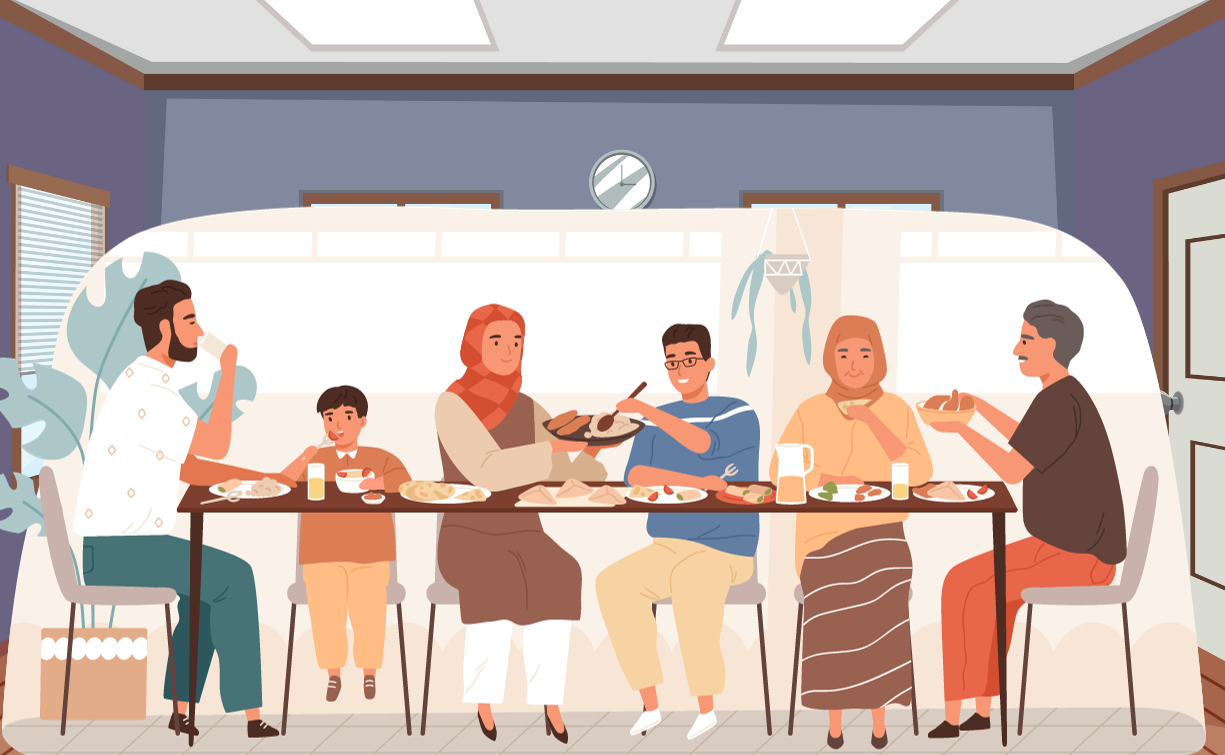The Arabic term “usra,” referring to “family,” derives its literal meaning from terms that signify cohesion, intimacy and safety. Maintaining positive ties with friends, family and acquaintances is highly valued in Islam. It is required of us as Muslims to have cordial relationships with our families. Preserving connections with parents, siblings as well as other close relatives is of the utmost significance in Islam. Love, trust and care form the foundation of family relationships.
“But those who break the covenant of Allah after contracting it and sever that which Allah has ordered to be joined and spread corruption on earth – for them is the curse, and they will have the worst home.” (Quran 13:25)
There are many different kinds of ties in Islam; but the most important kind is that of blood. The connection that matters the most is the one that we have with our parents. Our biological siblings follow next in importance, with their rights coming after Allah’s. One can judge a person by the way they treat their family.
Compassion is the basis of morality
Islam undoubtedly encourages Muslims to have compassion for all that Allah has created. This extends to our close friends and family members. Abdullah ibn Umar reported: The Messenger of Allah salallaahu ‘alayhi wa sallam said, “The merciful will be shown mercy by the Most Merciful. Be merciful to those on the earth, and the One in the heavens will have mercy upon you.” (At-Tirmidhi)
Always be kind and supportive
One ought to pay visits to their family members, learn about their affairs, spend money on them and provide support if they appear to be impoverished. People in need of assistance possess rights over us and the most important type of support is helping our relatives. Apart from developing a close relationship, it will give the helper an immense value for maintaining family ties. Salman bin Amir narrated that the Prophet salallaahu ‘alayhi wa sallam said: “Giving charity to a poor person is charity and giving to a relative is two things, charity and upholding the ties of kinship.” (Sunan An-Nasai)
Start with respect, the rest will follow
We presume that only older people deserve to be treated with respect and kindness. However, Islamic doctrine does not provide proof of such reverence for elderly on its own. Indeed, our dear Prophet Mohammad salallaahu ‘alayhi wa sallam constantly demonstrated admiration and affection for the young, including his own children. He adored them, handled them gently and taught them the way to live a compassionate life. It is crucial to realize that respect extends to everyone close to us. Furthermore, through being obedient and polite to our parents, we naturally establish a pattern for subsequent generations to emulate.
“And your Lord has decreed that you not worship except Him, and to parents, good treatment. Whether one or both of them reach old age [while] with you, say not to them [so much as], “uff,” and do not repel them but speak to them a noble word.” (Quran 17:23)
Forgiveness is the sweetest revenge
Every human tends to make mistakes and cause sorrow to those who are dear to them. However, we must learn to pardon the ones who have wronged us. We should realize the significance of making amends with people we might have never imagined could be pardoned, even though it can be at times the most difficult task we undertake. If we wish to be pardoned for our personal transgressions and faults, then we must extend forgiveness and mercy to our family members and ask Allah to pardon them.
“And the retribution for an evil act is an evil one like it, but whoever pardons and makes reconciliation – his reward is [due] from Allah. Indeed, He does not like wrongdoers.” (Quran 42:40)
A good relationship starts with good communication.
Humans communicate with others to share ideas, emotions and connections. Therefore, communication is the key element of our interactions. Effective communication skills are essential for building healthy relationships with parents, siblings, spouse and children. In all likelihood, individuals are calmer, less anxious and more willing to work through issues if they are understood as opposed to when they are misconstrued. Mutual respect and trust are also fostered by being heard and appreciated. With the advancement in technology, there are several ways for distant families to stay in touch with each other using social media platforms. Every member of the family must accept personal accountability and actively seek to maintain communication with the rest of the relatives.
Prophet Mohammad salallaahu ‘alayhi wa sallam has said, “Whosoever believes in Allah and the last day let him keep the ties of relations.” (Bukhari)
Conclusion
Family represents a gift that Allah has blessed us with. We frequently fail to comprehend the value of relationships and thus end up cutting of ties with those who are close to us. It is our responsibility as Muslims to protect and nurture the relationships within our homes. The ideal setting for fostering and passing on characteristics like empathy, generosity, affection and mercy is the family. It has been suggested that these principles not only enrich familial bonds but also act as the cornerstones of a healthy society. Muslims who devote their energy and time in building their familial bonds will receive innumerable benefits from Allah.
Written by sister Sumayya Syed





